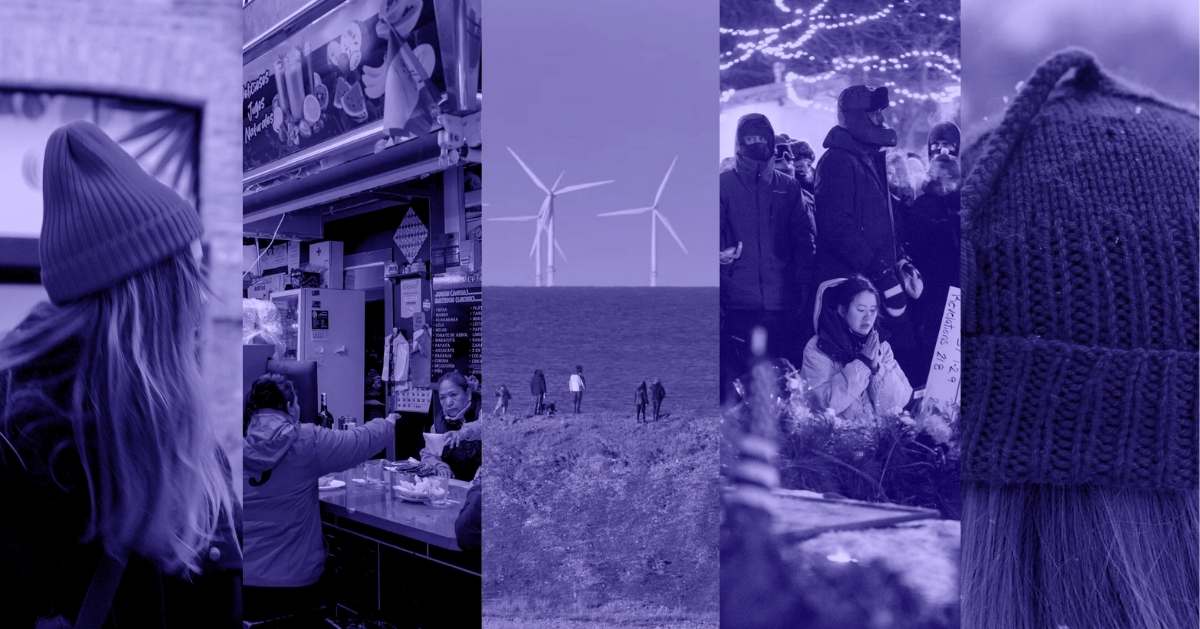Every day the Good Good Good team collects the best good news in the world and shares it with our community. Here are the highlights for this week!
If you want to get good news in your inbox every day, join the Goodnewsletter — the free daily newsletter designed to leave you feeling hopeful.
The Best Positive News We’re Celebrating This Week —
Two simple measures are helping cut hospitalizations from heat waves in half
From 2008 to 2020, there was an increase in heat-related emergency room visits in every single region of the US.
While higher-tech, more complex solutions are in the works to mitigate higher temperatures — for years, Los Angeles has been adopting an approach that relies on two more simplistic measures: painting rooftops and streets with white, reflective paint and planting more trees and vegetation.
And it could be saving lives. A recent study estimated that these efforts could significantly reduce ER visits by up to 50% during heatwaves.
Why is this good news? As the world keeps getting hotter (at least for a little while), we need accessible, affordable, uncomplicated solutions that work quickly to mitigate the impacts of heat waves and save lives. Painting and planting check all of those boxes.
→ Read more
The inaugural class of doctors just graduated a first-of-its-kind medical school in Cherokee Nation
The first physician training program on a Native American reservation and affiliated with a tribal government just graduated its inaugural class of doctors.
Nine Native people just graduated from Oklahoma State University’s College of Osteopathic Medicine at the Cherokee Nation, making up over 20% of the 46 total students.
Another 15 Native students are graduating from the university’s campus in Tulsa. Together, the graduates represent 14 different tribes, including Cherokee Choctaw, Alaska Native, and Seminole.
Why is this good news? These new doctors will help address the nationwide shortage of Indigenous doctors. Of the approximately 841,000 active physicians in the U.S., nearly 2,500 are Native American — just 0.3%. That shortage currently leads to a lack of “quality and timely care” at Indian Health Service clinics.
With a campus right in Cherokee Nation, students also get real-life experience caring for Indigenous patients.
The number of polio cases has dropped to 4,000 globally — a 100-fold decrease from 400,000 in the 1980s
Thanks to effective vaccination campaigns using two types of vaccines as well as improved access to clean water and sanitation — the number of annual cases of polio has dropped dramatically in recent decades.
In the 1980s, there were as many as 400,000 cases of polio globally — that number has declined to 4,000 in the last few years. That improvement has meant millions of children won’t experience lifelong paralysis.
Globally, we are close to eradicating all three types of wild poliovirus, with wild poliovirus serotypes 2 and 3 eliminated and only six reported cases of serotype 1 reported globally.
New vaccines are being administered to address the remaining cases, and eradicate the last stubborn cases — closing the chapter on polio globally once and for all.
→ Read more
New requirements are protecting national parks — and making them both easier and less crowded to visit
National parks around the country have seen record visitation numbers in recent years, resulting in unprecedented overcrowding (which puts an added strain on the parks).
In response, the National Park Service is taking steps to protect the parks, manage traffic flow, and prevent them from being overwhelmed by numbers they can’t accommodate.
Most notably, several of the most-visited parks have implemented permit systems, which require visitors to make advance reservations to enter. While some critics argue that the permit system will make it more difficult for visitors to experience the parks, most permit requirements only apply during peak visitation season.
→ Read more
More national park good news:
- Great Smoky Mountains National Park just expanded its adaptive excursions, allowing disabled visitors to bike, camp, and kayak in the park.
- The newest national park in the U.S., Amache National Historic Site honors a painful chapter in American history.
- Last year for Pride Month, drag queen Pattie Gonia celebrated Pride with Yosemite National Park rangers.
To help alleviate their water crisis, a rail worker coordinated sending thousands of gallons of drinking water to the Navajo Nation by train every month
After getting laid off from his “dream job” of 25 years in the railroad industry, Andrew Halter pivoted to act on another dream of his alongside his brother, who runs a school on the Navajo Nation reservation.
After witnessing the ongoing water crisis on the reservation — nearly one-third of Navajo Nation residents don’t have access to reliable, clean drinking water — Halter and his brother envisioned using rail to shuttle in clean water for the people living there.
Trucks had already been delivering water to a small portion of the families in need, and they each received about 40 gallons per day (the average American family uses 300 gallons per day).
Halter knew operations needed to scale up — and now his company, Jacob’s Well delivers thousands of gallons of water every month from the Mississippi via the BNSF Railway.
Halter is now working to bring more water to more reservations where reservoirs and water supplies are drying up.
After incorporating Negro Leagues statistics, Josh Gibson became Major League Baseball’s all-time batting leader
In 2020, Major League Baseball officially recognized that the Negro Leagues, which operated from 1920 to 1948, were major leagues. And after a three-year research project, league statistics were officially incorporated into the MLB record books.
With the incorporation, Josh Gibson became MLB’s all-time batting leader with a .372 batting average. Alongside other legendary Black players, Gibson also topped the leaderboard for a single-season batting average of .466 in 1963.
While the process to incorporate the Negro Leagues statistics has been intensive and thorough, MLB’s historian estimated that about 75% of the league’s box scores have been documented — and they’ll continue to make updates to official records.
Why is this good news? While true justice would look like segregation in MLB never happening, incorporating the statistics of players who were systematically excluded from the league is an important step in righting that historical wrong. And Gibson’s position atop that leaderboard is a long-overdue recognition in sports history.
More good news of the week —
One state in India is using AI to monitor elephant movements on train tracks to prevent further deaths. Elephant deaths on and near Tamil Nadu’s railway tracks are rising, with 36 fatalities recorded from train collisions in the past decade.
Under a new veterans law, more than 1 million claims related to toxic burn pit exposure have been granted. Representing around 888,000 veterans and survivors in all 50 states, about $5.7 billion in disability benefits have been distributed.
Wind power overtook gas as the UK’s largest source of electricity in 2023. Wind made up 32% of output in Britain for the first time, overtaking gas, which had held the top spot for nearly three decades.
Indian Railways is about to be 100% electric, making it the largest green railway in the world. Electrification is happening over nine times faster than what it was a decade ago, from 1.42 km per day in 2014-15 to about 19.6 km per day in 2023-24.
The Central African Republic just became the first country to receive thousands of doses of a new malaria vaccine. Recommended by the WHO last October, a total of 43,000 doses arrived by air today from UNICEF, and another 120,000 are scheduled to show up in the coming days.
Scientists just achieved a new breakthrough in a non-hormonal, reversible, non-toxic male birth control. They were successfully ablet o target a protein crucial to making fertile sperm, giving men control over their protection window.
To address the environmental impacts of toilet paper, major companies are rolling out more eco-friendly alternatives. Making TP is an energy- and water-intensive process that requires toxic PFAS and other chemicals, and can be an insoluble pollutant that resists wastewater treatment.
New EPA regulations close loopholes that have allowed coal-fired power plants to pollute the air and water for decades. While clean energy alternatives are rapidly growing, fossil fuel plants still generate 60% of the U.S. electricity supply — the new rules will help address the pollutants they produce.
The first of its kind in the U.S., Vermont just passed a bill requiring fossil fuel companies to help pay for destruction caused by climate-fueled extreme weather. The money will go toward modernizing infrastructure, cleaning up after storms, addressing public health costs of climate change, and more.
Renewable sources made up nearly 30% of electricity generation in the U.S. in March. Solar, wind, hydropower, biomass, and geothermal provided 29.2% of electricity, the second-highest source behind natural gas, at 39.4%.
A “gamechanging” breakthrough in breast cancer research, scientists discovered how to preserve breast tissue outside the body for at least a week. They found tissue could be preserved in a special gel solution, which will help scientists identify the most effective drug treatments for patients.
California’s first Black land trust is making the outdoors more inclusive — and fighting climate change. The 40 Acres Conservation League is creating outdoor space where Black Californians and other people of color can feel at home in nature.
A new woman-owned sports bar in Minnesota caters exclusively to women’s sports and its fans. A Bar of Their Own is similar in concept to Portland’s The Sports Bra, which just announced plans to franchise and expand.
Thanks to new “vibrating” jerseys, soccer fans who are deaf or hard of hearing can better experience the atmosphere of a match. Newcastle United just introduced the “haptic” shirts for fans, which use sensors that vibrate when action takes place on the field.
Mattel recently announced a series of nine, one-of-a-kind Barbies honoring trailblazing women athletes. The dolls are part of a larger initiative and partnership with VOICEINSPORT to fight stereotypes that keep girls from achieving their dreams.
New “game-changing” research found even more evidence for preventing peanut allergies in children through early introduction. The research demonstrates children can build protection from peanut allergy if they consume peanut products from 4 to 6 months through age 5.
Billionaire philanthropist Melinda French Gates announced a $1 billion donation to support women’s rights. About $200 million will go to organizations fighting for gender and reproductive rights in the United States.
The NOAA confirmed a critically endangered whale was just spotted off a California coast. Researchers spotted the North Pacific right whale, the rarest whale in the world with likely fewer than 500 remaining globally.



